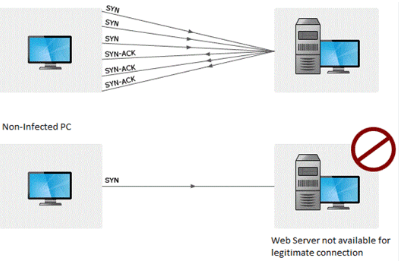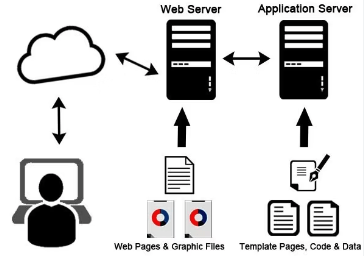
- Definition of a Website Server
- Web Server History
- Types of Web Servers
- Benefits of Web Server
- Hardware and Software Used in Web Servers
- The roles that web servers play
- Website server trends
- Conclusion
A web server is the central part of the Web. It will website hosting platforms and serve web content. When a user types an address to some website in his browser, the web server will process this request. It will return appropriate files, usually HTML pages, images, and scripts, to the user’s device for rendering. This is what websites, web applications, and any web service fundamentally rely upon. Cybersecurity Training Courses can website hosting platforms static content, such as simple web pages, or even more complex dynamic content created on the fly by server-side applications. They function through protocols such as HTTP (Hypertext Transfer Protocol) and HTTPS (HTTP Secure), ensuring secure and reliable communication between the server and the client.
Definition of a Website Server
The content of a website security is stored and transported by a web server. With the aid of a web server, any text, photos, videos, application data, and other content that the user requires is provided. The web server network retrieves the information from the website each time a user clicks on a link or initiates a download. Let’s look at the definition of a Web Application Security to assist you in better comprehending it. It comprises the hardware and software that use the hypertext transfer protocol (HTTP) and other protocols to react to queries on the World Wide Web. Customers make these requests. Its primary responsibility is to display a website’s contents to any user who requests them. Data delivery, processing, and storage are all part of this process. The hardware of a web server facilitates data flow between devices. The web server’s software component manages users’ access to the hosted files in Cybersecurity . The web server software must be installed on all systems that website hosting platforms websites.
Are you curious to know more about Cybersecurity ? Take advantage of our comprehensive online Cyber Security Online Training .
Web Server History
Tim Berners-Lee suggested the first web server in history for his company, the European Organization for Nuclear Research (CERN), in 1989. In the meantime, they were collaborating on a new project, which involved developing and implementing a hypertext system to ensure the success of web server technology. As a hypertext project, they developed the code created on NeXTSTEP.
The first World Wide Web server ever operated in the CERN lab. Berners-Lee released his software in 1991. Subsequently, CERN decided to introduce the Web Security as a free-to-download standard into the general public server realm. Tim Berners-Lee’s decision to join the World Wide Web Consortium (W3C) in 1994 forced them to advance the technology to create HTTP, HTML, and other technologies.
Types of Web Servers
- Dedicated Web Servers:These servers are used by a single organization or website. They offer maximum control, performance, and security and are perfect for high-traffic websites or applications.
- Shared Web Servers: Several websites share the same server and its resources. This is a cheap option for small website security scan or personal blogs, but it may result in performance issues if one of the sites experiences heavy traffic.
- Virtual Private Servers:VPS website security platforms combines shared and dedicated server network . Many users can be hosted on the same physical server, but resources are dedicated to each; thus, the users will have better control and higher performance than those of a shared host.
- Cloud web servers: These are simply web servers based on cloud computing technology. Resources may be scaled up or down according to demand, allowing cloud servers to host a business that requires variable-sized traffic.
- Reverse Proxy Servers Reverse Proxy Servers are middlemen between the user and the web server. They distribute the client requests and, hence, provide load balancing, E-mail Security, and caching.
- Managed Web Servers: A managed hosting options service provider manages the web server, including maintenance, security patches, and updates. Businesses that do not have the time or inclination to manage their servers can hire web servers.
- Content Delivery Network (CDN) Servers: Web content is delivered to all users quickly and without latency by a distributed global network of servers of any CDN. This ensures proper load times.

Sign up for ACTE Cyber Security Online Training and get a head start in your career cyber security.
Benefits of Web Server
- Website Hosting: Web servers store, process, and serve web content to provide access to user . They allow any individual or organization to present an online presence by creating websites, blogs, or web applications.
- Scalability: Web servers can react to higher traffic and user requests by spreading the traffic across several servers. This ensures that website security scan remain accessible and responsive even at peak traffic times.
- Static and Dynamic Content Served: Web servers may serve static and dynamic content. Static content includes presentation files such as HTML pages, images, and stylesheets. Dynamic content refers to content generated by server-side scripts executed through PHP, Python, or Ruby.
- Multiple protocols:Web servers also support several protocols, mainly HTTP and HTTPS. This ensures that the information that goes between the clients and server network is secure, giving the user a better experience in trusting the applications and the integrity of the information.
- Content Management: Most web servers are integrated with CMSs, such as WordPress, Drupal, and Joomla. This integration makes handling web content easier so that even non-technical users can update and maintain websites easily.
- Database Integration:server security can dynamically interact with databases to store and retrieve data. This allows the development of data-driven applications, thus enhancing user experience and functionality.
- Load Balancing and Failover: Web servers can work in concert with load balancers, distributing incoming traffic and offering redundancy. This architecture increases reliability and uptime; therefore, the services are accessed without interruption.
- Security Features: website security have several security features, such as SSL/TLS for secure connections, firewalls, and access controls. These safeguard website security scan from Cybersecurity, keeping data confidential and securing users.
Hardware and Software Used in Web Servers
The effective functioning of web servers depends on both hardware and software. In terms of hardware, a web server can be fitted with high-powered processors, sufficient RAM, and enough storage capacity to serve multiple requests at the same time. Fast network interfaces are important for quick data transmission, while redundant power supplies and cooling systems ensure reliability and uptime. The choice of hardware depends on the scope of the operations. It ranges from personal, small sites website hosting platforms on a shared server security to large enterprises running on dedicated or cloud-based servers.The web server runs a special application called the Apache server, Nginx server, Microsoft IIS server network , or LiteSpeed. All of these have control over client requests and delivery of their content content. Such applications handle static files, serve server-side scripts, and interact with the database. Besides, web servers are usually accompanied by the integration of an operating system like Linux or Windows Server for stability in hosting options . Also, hardware is commonly coupled with Database Security software such as firewalls and intrusion detection systems for protection against cyber threats. Overall, this hardware-software combination represents a very solid foundation for the delivery of web content efficiently and safely.

Transform Your Career with Cyber Security Knowledge Enroll in ACTE’s Cyber Security Expert Masters Program Training Course Today!
The roles that web servers play
It’s crucial to begin with comprehending the many operations of a server security for the internet to fully understand all of its features. In general, web servers perform the following tasks:
- All website security data is stored and configured on web servers. Data is shielded from unauthorized users by doing this.
- The primary duty of web servers is to make hosting options Cybersecurity Training Courses accessible. This includes making back-end databases and their services accessible.
- Your website security scan web server network will respond appropriately when prospective customers and guests from all over the World Wide Web attempt to visit it. These prospective customers and guests are referred to as end users, and their access requests are referred to as end-user requests.
- Web servers aid in bandwidth management. They are designed to reduce excessive network traffic, which in turn controls network traffic as a whole. This web server feature significantly reduces downtime, which is typically caused by excessive web traffic.
- When a web server is present, dynamic web pages can be created using well-known scripting languages like Perl, Ruby, Python, and others.
Preparing for Cyber Security job interviews? Check out our Cyber Security Interview Questions and Answers now!
Website server trends
- Serverless Architecture: server security is the term used for enabling developers to run applications without managing infrastructure. Therefore, the provider of clouds, such as AWS Lambda, Azure Functions, and Google Cloud Functions in Cybersecurity , takes care of scaling, availability, and resource allocation for scaling applications.
- Edge Computing:Edge computing brings the processing closer to the source (user or device) rather than relying solely on centralized data centres.
- Containerization and Kubernetes:Containers (via technologies like Docker) and container orchestration platforms (like Kubernetes) are widely used for deploying and managing applications in a highly scalable, isolated environment.
- HTTP/3 and QUIC Protocol:HTTP/3 is the next generation of the HTTP protocol, which builds on top of QUIC (Quick UDP Internet Connections) and aims at website security performance and security improvements.
- AI-Driven Automated Server Management: Utilization of AI and machine learning for automated server security management to optimize the usage of the server network resources, which predicts the potential issues before they arise.
- Cloud-Native Servers and Infrastructure: More and more companies are moving towards cloud-based infrastructures instead of on-premise servers. The popular cloud providers are AWS, Google Cloud, and Microsoft Azure.
- Microservices Architecture:The monolithic architecture is not in use today; the application is split into smaller, independently deployable services known as microservices architecture.
- Web Server Security Enhancements: While Cyber Awareness are rising, securing web servers with tight practices is now a critical requirement involving tools such as TLS/SSL encryption, Web Application Firewalls, and DDoS protection.
- Virtualization and Cloud Containers:In virtualization technologies such as VMware and cloud containers like Kubernetes and Docker, better resource usage is allowed and multiple workloads can be run in one physical hosting options.
- Container and Serverless Hybrid Models:The hybrid architecture is applied by a few sites that utilize container-based and server security functions for complete flexibility.
Conclusion
Web servers are the backbone of the internet, as they are always a necessary tool for giving content and services to millions of users worldwide. They enable businesses and individuals to hosting options their website security scan applications, or other digital services. Thus, organizations choose the best fit according to their desired performance, scalability, and budget because of the diversity of web servers, whether dedicated and shared servers or cloud-based solutions. These functionalities go beyond simple content delivery for the Cybersecurity Training. They could also be related to dynamic linking with content creation, interaction in database operations, or even stronger security to hold secret or personal information privately. The growth of web traffic, which is at an accelerated pace, therefore necessitates a stable and reliable infrastructure of the web servers.





